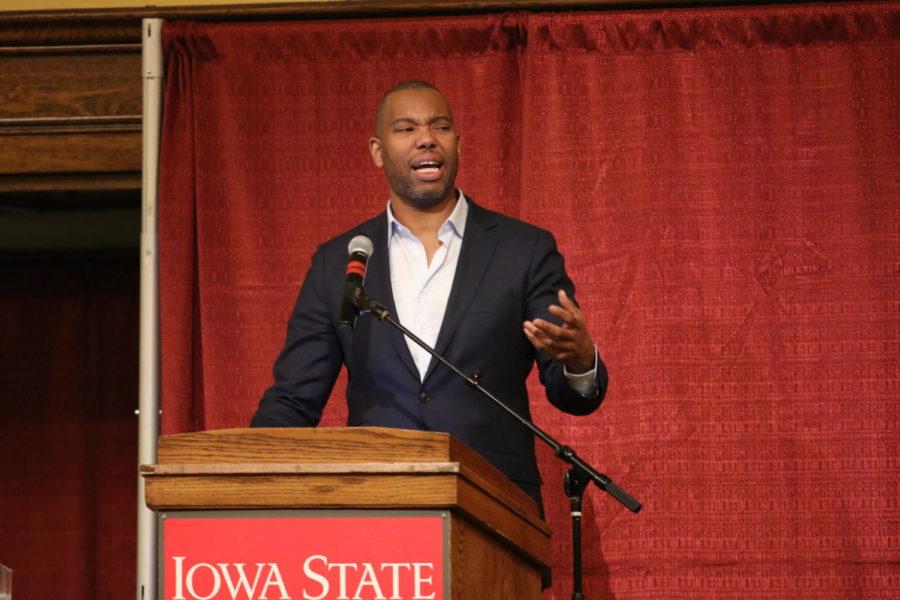Award-winning author Ta-Nehisi Coates talks race issues, politics and current events
Chris Jorgensen/Iowa State Daily
Writer Ta-Nehisi Coates reflected back to the days of slavery to explain how racism has been ingrained into the system in America. Blacks, Coates said, were treated like inanimate property.
January 30, 2017
Author and activist Ta-Nehisi Coates argued during a lecture Monday that what society currently thinks of race is a result of the different experiences every individual has had in response to other individuals.
Society puts others into a box based on one characteristic — race. From there, Coates said, judgements are made.
Coates wrote the 2017 cover story for The Atlantic titled “My President Was Black,” which detailed former President Barack Obama’s journey in politics and what could come next in President Donald Trump’s America.
Speaking to a packed crowd in the Great Hall of the Memorial Union, Coates spent much of his time discussing current events, while also giving historical context to his arguments.
“Race is the child of racism, not the father,” Coates told the crowd.
Dating back to the Constitution, with the fugitive slave clause, Coates said, “The idea that by the very nature of being black, you don’t have the same rights as someone else.”
Coates compared slave owning in the past to home owning today. Home owning is desirable today, and before the Civil War, owning slaves also was seen as desirable.
“People were considered property – and it was a profitable business,” he said.
Coates spoke of current events, specifically the executive order enacted by Trump this past weekend to ban Syrian refugees from entering the United States.
Over a hundred students at Iowa State are directly affected by this order, some of whom spoke with Coates before the lecture.
Coates called the order a lie, saying that anything currently being done in concern for our safety is a lie told to us by our government.
“History often repeats itself,” Coates continued. “The lies that were once told are carried on.”
Coates spoke directly to young people at the end of the lecture, telling them that elections in America matter.
Using the last election as an example, Coates said, “Sometimes you have to go with the choice you don’t really like because the other choice is reprehensible.”
Coates told the crowd that elections have consequences, and that every citizen needs to be responsible for their vote.
The lecture ended with a question and answer session. The questions were focused on race, with Coates praising Black Lives Matter, encouraging young people to get involved with activism and discussing his personal struggle in the public school system.
Alexis Dietz-Noel, freshman in elementary education, attended the lecture. She said that through Coates she got a different perspective of how race was viewed in America, and she particularly connected with Coates’ use of comparing slave owning to home owning.
Iryl Bacdayan, sophomore in biochemistry, also attended the lecture. She said she was “struck” by Coates’ comments on voting in elections.
“I hadn’t thought that my vote mattered that much, but after this election, I know that it does,” she said.
Coates is the author of the bestselling books “Between the World and Me” and “The Beautiful Struggle.”
Coates won the George Polk Award for Commentary in 2014 for his Atlantic cover story, “The Case for Reparations.” In 2015, he was named a MacArthur Fellow.







